
Private Internet Access VPN
Private Internet Access (PIA) is a VPN with robust privacy, global server coverage, and competitive pricing, offering a reliable, no-frills solution for secure online experiences.
Pros
91 countries, Multi-Hop, RAM-Only servers
Advanced Privacy Tools like Kill Switch PIA MACE.
Dedicated IP VPN, automation, split tunneling.
Budget-Friendly Pricing for long-term plans.
Cons
Minimalistic interface, some navigation challenges.
Collects minor data and potential information sharing.
You can trust Geekflare
Imagine the satisfaction of finding just what you needed. We understand that feeling, too, so we go to great lengths to evaluate freemium, subscribe to the premium plan if required, have a cup of coffee, and test the products to provide unbiased reviews! While we may earn affiliate commissions, our primary focus remains steadfast: delivering unbiased editorial insights, and in-depth reviews. See how we test.
Even with all the freedom and limitless social, educational, and business opportunities that the Internet offers, there is a dark side to it. Navigating a digital jungle where cyber threats lurk around every corner can be a bit daunting, but it is the reality of today. While there are many solutions for this purpose, arguably, none can beat the ease of using a reliable virtual private network.
VPNs are everywhere these days, and for good reason. Whether it’s for personal use or business needs, they’re becoming a go-to tool for internet users. But here’s the catch — with so many VPNs on the market, picking the right one can feel like finding a needle in a digital haystack. That’s where I come in to review them, and now, it’s time to put Private Internet Access (PIA) under the microscope.
Getting started with PIA
Private Internet Access (PIA) is a VPN that stands out in the crowded VPN market and is renowned for its strong commitment to privacy, impressive performance, and rich set of features. It’s been on the scene for quite some time, but the big question is — does it still hold its own against the newer, more popular VPNs out there?
PIA is available across all major platforms like Windows, Mac, Linux, Android, iOS, etc., and installation is straightforward on all platforms. Getting it set up is a breeze, no matter your platform of choice.
PIA’s Interface
While most VPNs go overboard with huge windows/tabs to display all options and features, PIA takes a different route with its minimalistic approach. The best part is that it can be easily accessed through the system tray, and the core features of the VPN are ready to use right away, without the need to navigate or load the entire application.
The PIA’s interface is divided into blocks and can be adjusted to your liking, enhancing ease of use. Though it is minimal, it isn’t intuitive and does have some limitations, like being unable to access the connect button when expanded.
While you might need a bit of time to familiarize yourself with PIA’s interface to unlock its full potential, including accessing all servers and quick settings, it’s not a steep learning curve. The good news is that it’s straightforward enough that just a few minutes of exploring should have you navigating it like a pro.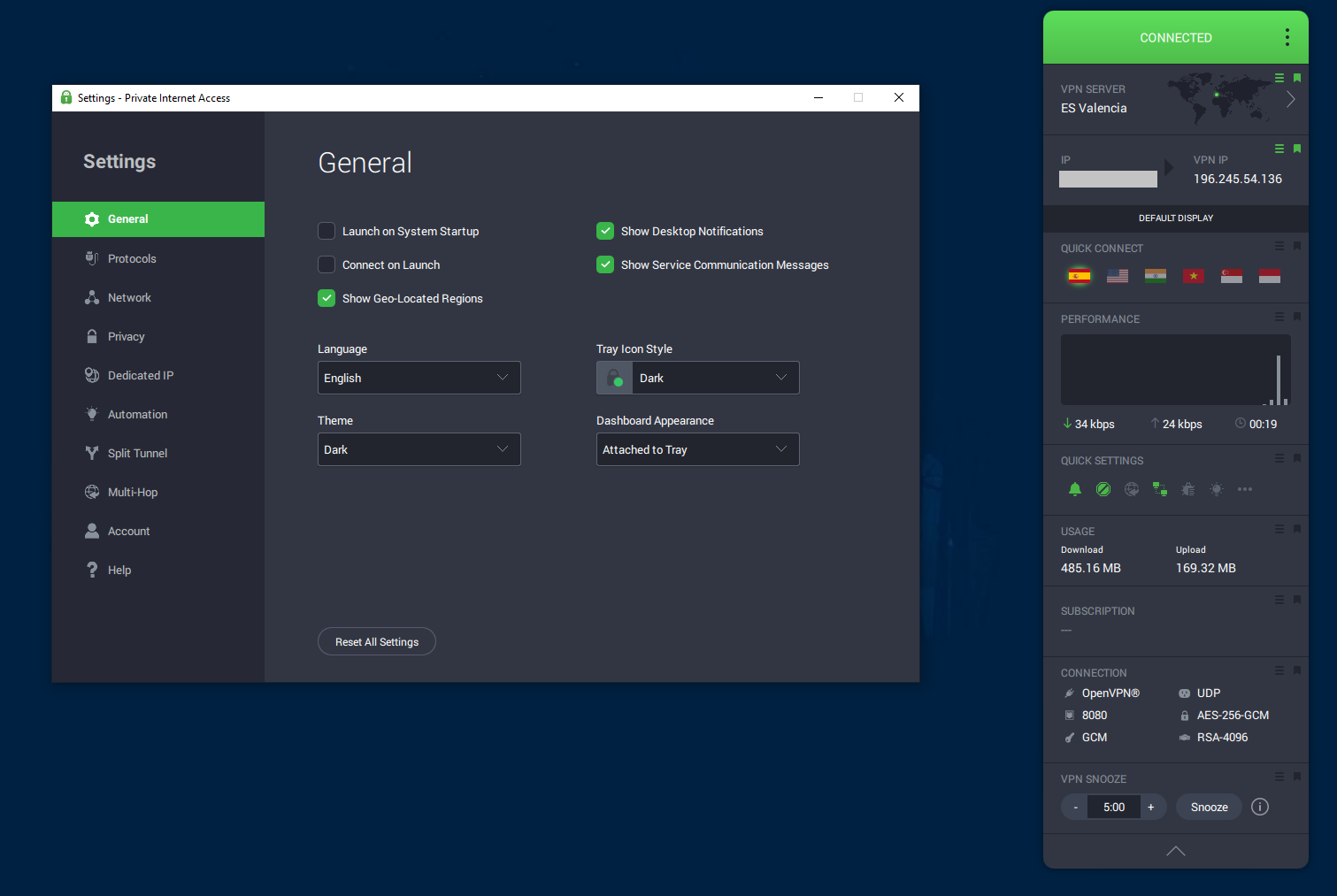
PIA’s Encryption
Private Internet Access (PIA) offers top-notch encryption. PIA takes your online security seriously, offering robust protocols like WireGuard and OpenVPN to keep your data safeguarded.
Apart from strong encryption, this VPN also believes in giving you control. You get the flexibility to tweak vital encryption settings, including the transport type, data encryption levels, and configuration methods. So, you have the keys to your own digital fortress, allowing you to tailor your security to your specific needs.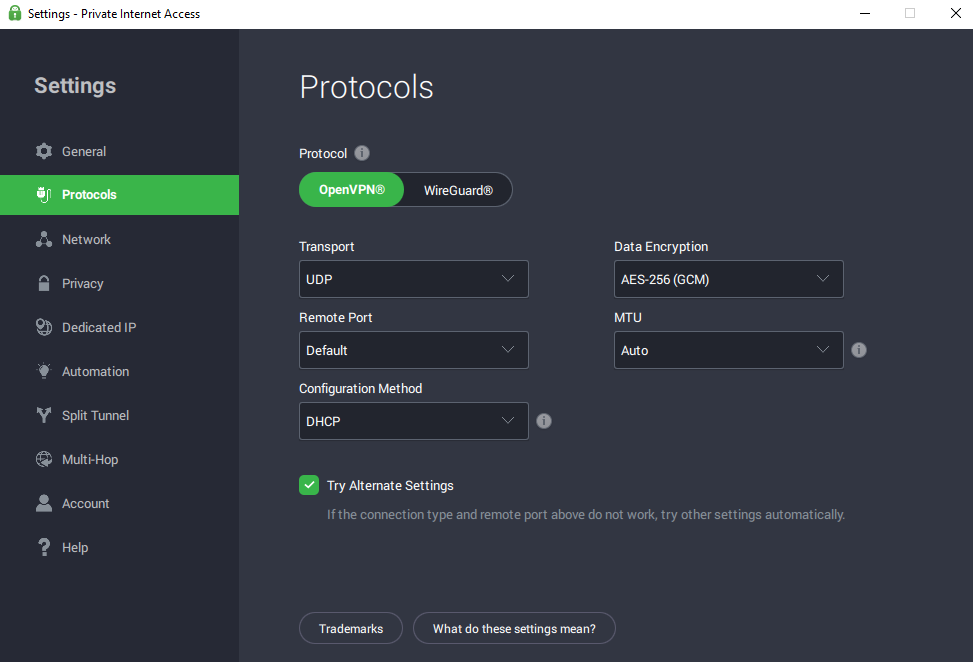
While everything feels promising, I have taken the risk and tested it with Wireshark, a free and open-source packet analyzer, and here are the results below:
Capturing Packets with and without PIA
To find the encryption capabilities of PIA, I visited an unsecure HTTP page, and Wireshark instantly detected it and displayed it in green like below.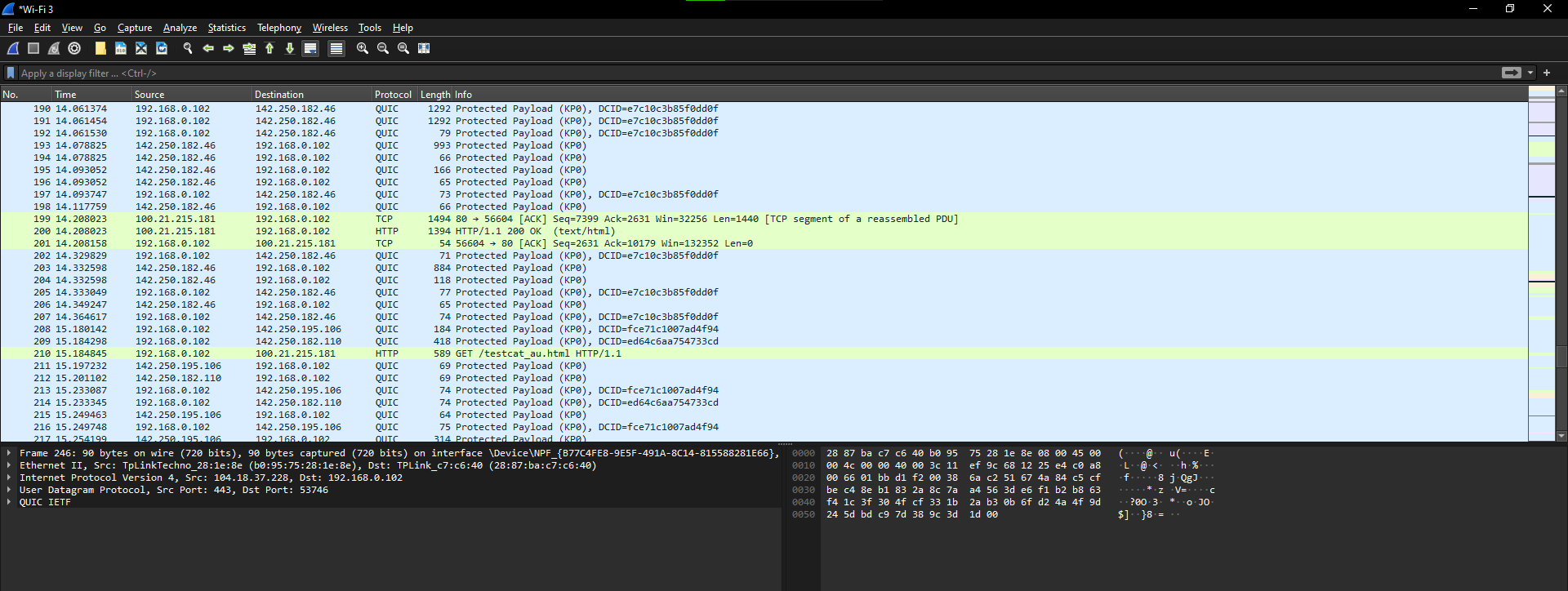
Now, I have set my VPN protocol to OpenVPN, set the transport as UDP, and set data encryption as AES-256 (GCM). Next, I connected to a server on PIA and recaptured packets after turning it on, and Wireshark didn’t warn about any unsecure packets.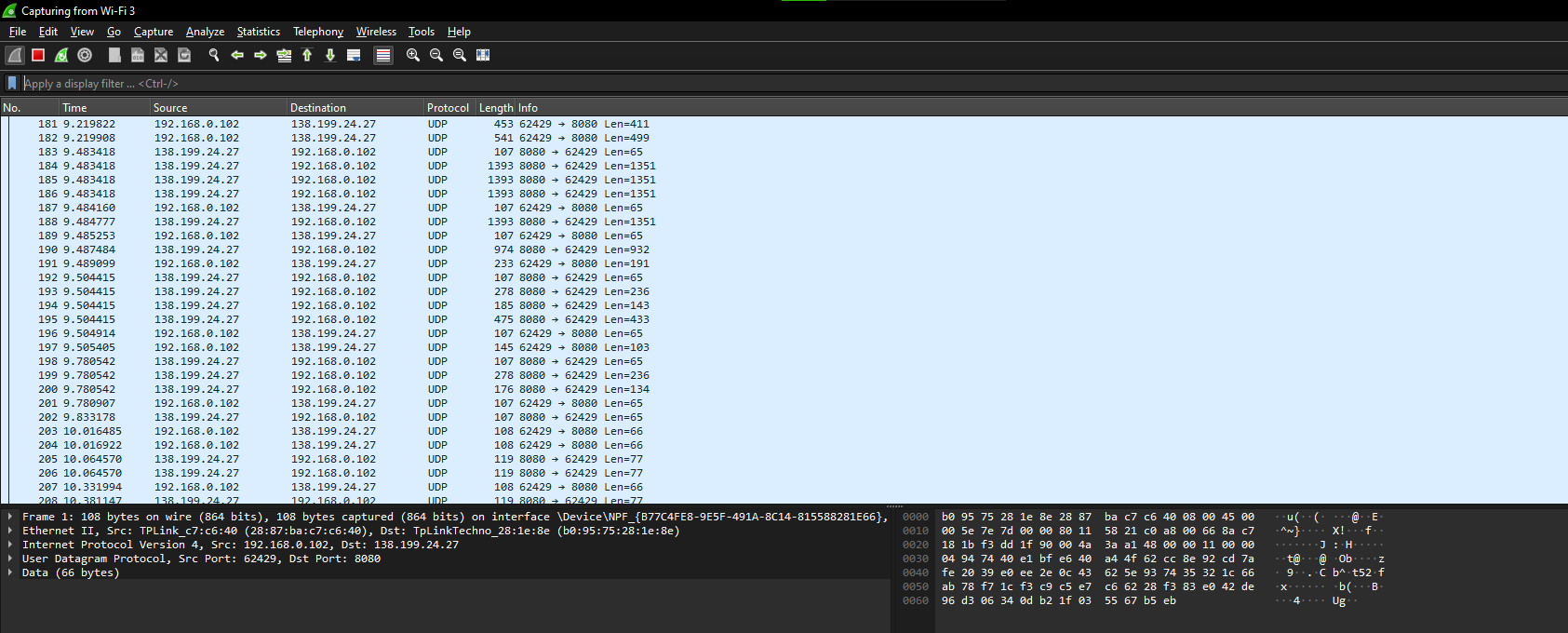
Following Packets with and without PIA
At this point, you might think you’re all set with your data securely encrypted. But data leaks can still occur, often slipping through the cracks of less-than-perfect encryption. Tools like Wireshark aren’t always quick to catch these leaks, so I put PIA to the test and decided to track the data stream without using PIA at first. Here’s what I discovered:
If you notice, the entire conversation is readable, and an intruder who has access to your network can easily gain access to personal information like passwords, web history through DNS records, and other critical details.
So, I switched on PIA, using the same configuration settings mentioned earlier, and tracked the data again, and this time, the entire packet stream was encrypted. The conversation was now a jumble of indecipherable code, resistant to casual analysis or reading.
While it’s true that these encryptions could potentially be decrypted, it’s important to note that such capabilities are typically in the hands of high-level security organizations or extremely skilled hackers. For the average user, PIA’s encryption offers a robust shield against common threats.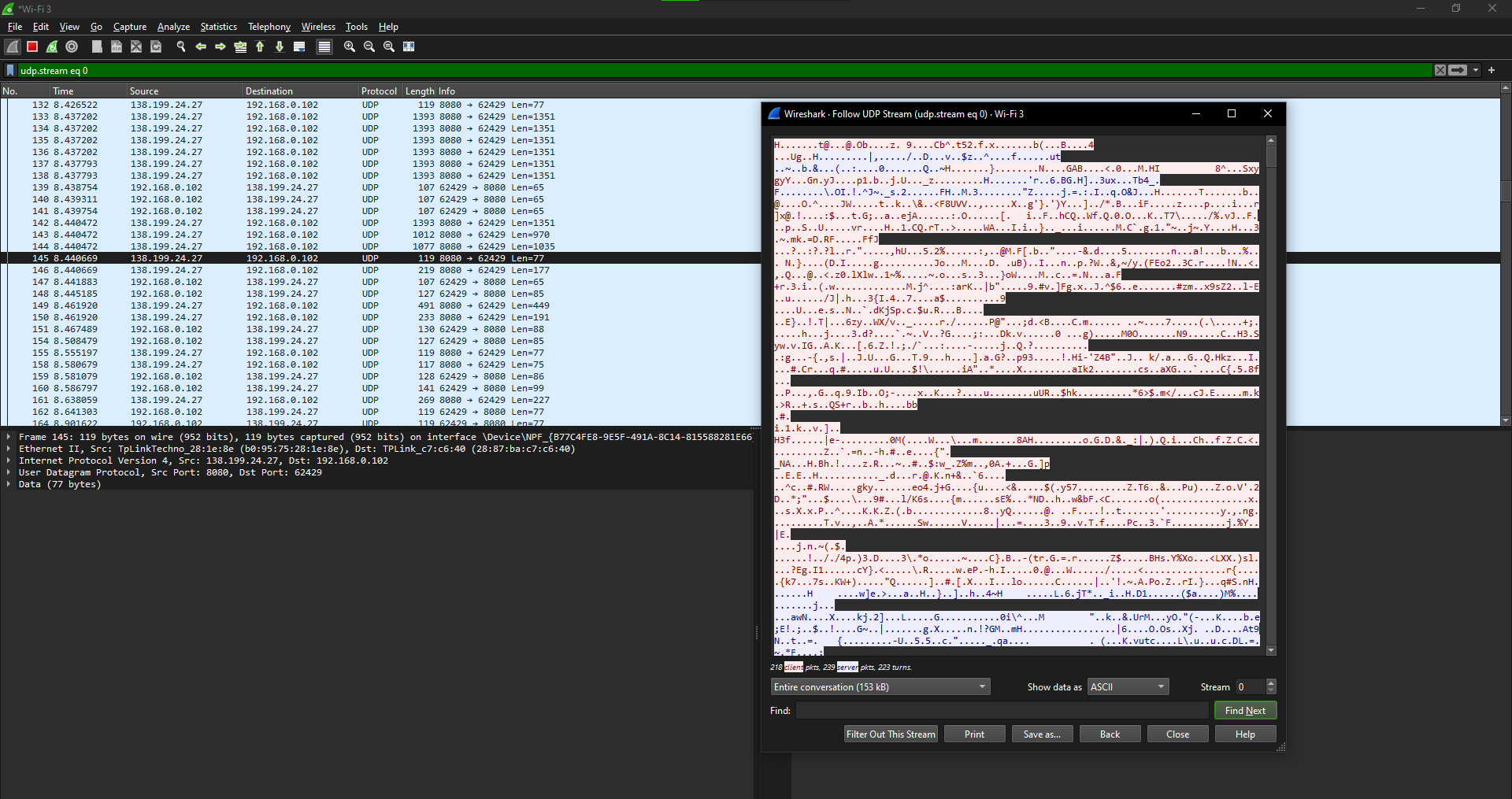
Does PIA encryption matter?
While the above tests are made by creating scenarios, I also wanted to see how things played out in everyday web browsing without PIA active. So, I casually surfed the web and simultaneously tracked a few data packets using Wireshark. To my surprise, Wireshark flagged several instances of unsecured protocols transmitting unencrypted data.
To cross-check, I have done the regular browsing with PIA turned on and recaptured packets with Wireshark and noticed a massive change where, except for ICMPv6, there were no other unsecured protocols captured.
Note: Unsecure protocols like MDNS, SSDP, IGMPv3, LLMNR, MADCAP, ARP, and UDPENCAP, including ICMPv6, feature unencrypted data. However, rest assured, as they typically operate within the local subnet and are not routed over the internet.
IP/DNS/WebRTC Leak Test
It is important to check for IP and DNS leaks while using a VPN, as these leaks can undermine the privacy and security that the VPN is meant to provide. An IP leak occurs when your real IP address, assigned by your Internet Service Provider (ISP), is exposed to the websites or services you visit despite being connected to a VPN.
Similarly, a DNS leak happens when your device sends DNS queries to your ISP’s DNS servers rather than the VPN’s secure DNS servers, potentially exposing the websites you visit.
Considering the importance of the IP and DNS test, I have turned on PIA and put it to the test, and here are the results: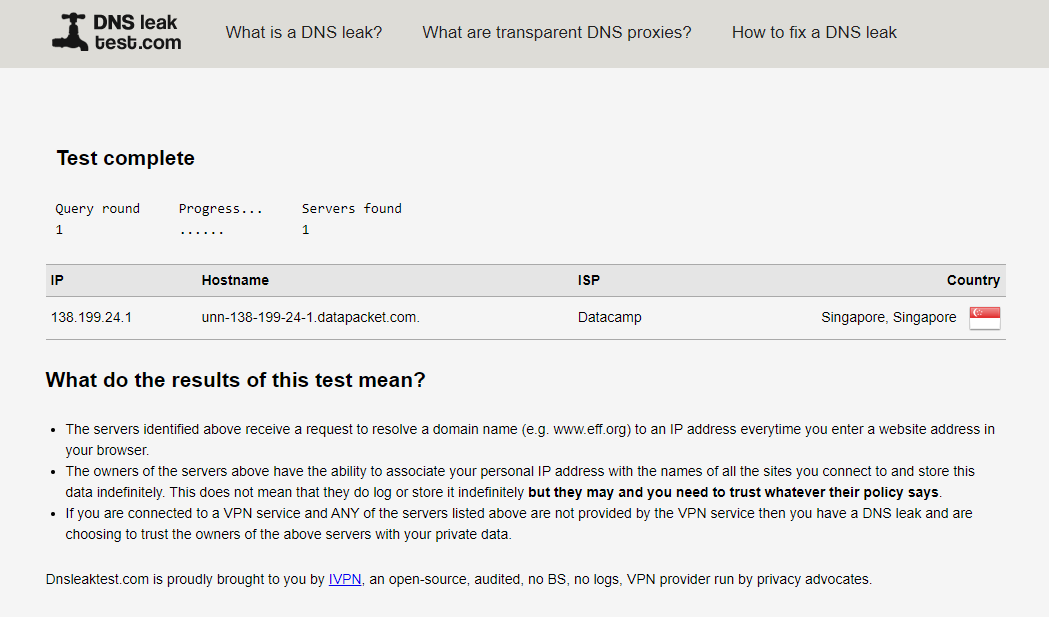
After performing the test multiple times, I realized that my IP wasn’t disclosed, irrespective of the platform. Furthermore, PIA offers the servers listed in the result, and none of my ISP servers are listed.
Even though PIA has done well with IP and DNS leak tests, I wanted to be certain, so I made a WebRTC leak test part of my evaluation to confirm if my IP information is revealed via STUN requests. Once the results were out, I noticed my Public IP was replaced with the IP provided by the VPN.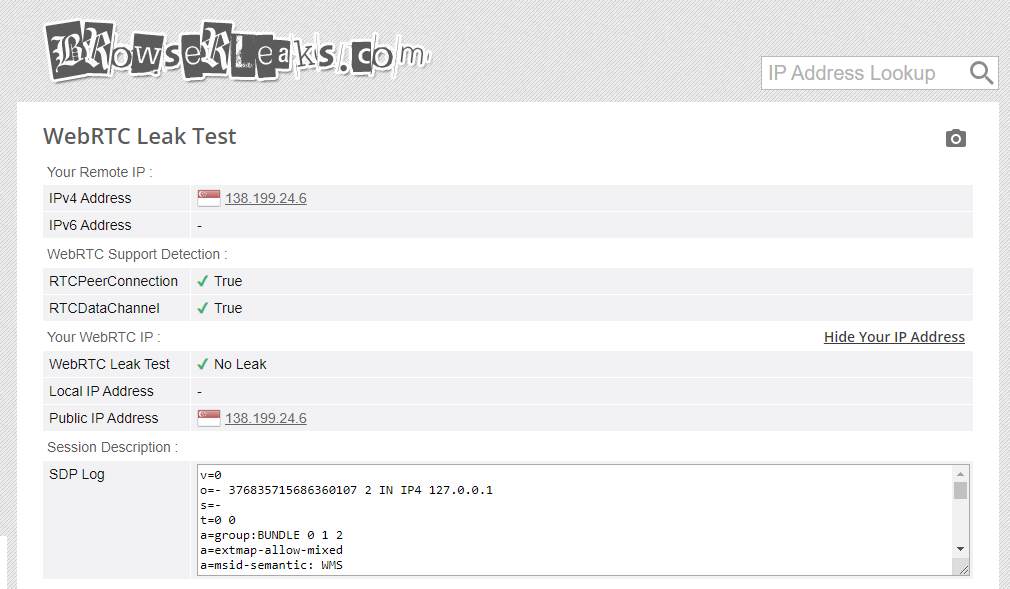
Speed Test
While factors like security and encryption are crucial in assessing a VPN’s quality, speed is the ultimate deal-breaker. Because everything from your everyday browsing to streaming your favorite shows and downloading torrents hinges on it.
A VPN that checks all boxes but crawls at a snail’s pace is a no-go. So, to really see what PIA is made of, I put it through its paces by connecting to an Indian server. Here’s how it fared: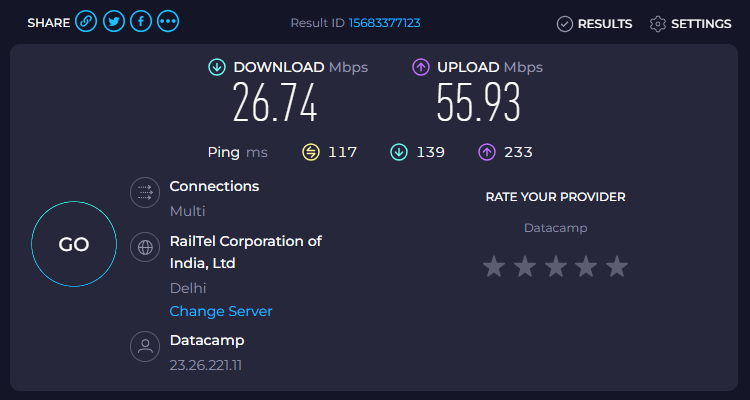
With the speed test results available, I turned off my PIA and performed it again. On comparing both results, I realized that PIA turned out to be underperforming.
However, looking at the bright side, it was able to stand tall against some of its competitors, and unless used for high-res streaming, there is nothing to complain about.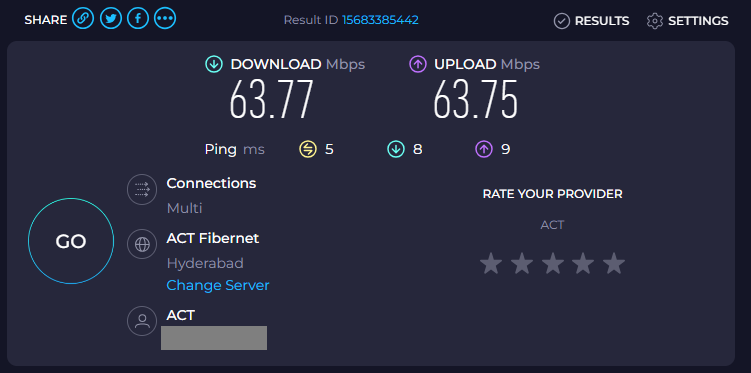
Pro Tip: Experiment with different VPN protocol configurations and perform a speed test with each change to figure out the combination that gives the best speed. Moreover, connect to the server that is nearer to you for better speeds and reduced latency.
Where does PIA stand out?
Based on the tests I’ve conducted, you might think PIA is just another run-of-the-mill VPN, performing well but not necessarily standing out. This raises an important question: What sets PIA apart from the pack, especially when compared to feature-rich VPNs like NordVPN, ExpressVPN, or Surfshark?
While it’s true that PIA may not go toe-to-toe with these giants in the feature department, it has its own unique strengths. Let’s delve into what makes PIA a worthy contender, despite it not boasting those ‘exclusive’ features.
PIA’s Server Network
Private Internet Access (PIA) offers a comprehensive VPN service with a global reach and a focus on privacy and performance. While the speeds aren’t impressive, I was able to connect to all servers of PIA with ease, irrespective of distance.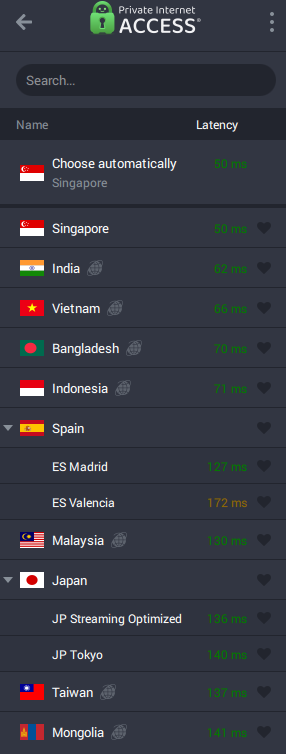
Here are a few key elements about PIA’s server network that make it stand out:
- PIA spans 91 countries, ensuring wide coverage and accessibility.
- It can offer up to 10 Gbps connections for speedy browsing, streaming, and downloading.
- PIA features RAM-Only servers, and as a result, all session data is deleted upon reboot, enhancing privacy.
- The VPN comes with a few colocated servers, which are exclusively managed by PIA’s team for increased security and control.
- Servers come with Multi-Hop security, which adds an extra layer of encryption by routing traffic through two servers. Also, it offers obfuscation, which can hide the fact that you’re using a VPN.
PIA’s Privacy Tools
Even though PIA offers exclusive features or introduced new tools, it hasn’t compromised with its privacy tools.
Not all VPNs are created equal, especially when it comes to features like the VPN Kill Switch. PIA takes this a notch higher with its Advanced Kill Switch, a must-have for any serious VPN user.
This feature ensures that your traffic is completely cut off from the internet if PIA is turned off, providing an extra layer of security. Then there’s PIA MACE, a standout feature that caught my attention. With MACE activated, my web experience was remarkably smoother – no annoying ads, no intrusive trackers.
It’s like surfing in a clean, private bubble, and when you combine these features, PIA almost transforms into an antivirus tool, actively analyzing and blocking any suspicious malware or harmful network traffic in real time. It’s like having a digital bodyguard for your online activities.
PIA’s Exclusive Tools
PIA offers 3 tools that are listed below. While these tools might be common, the way they are implemented by PIA makes them stand out.
#1. Dedicated IP VPN
PIA offers a dedicated IP option, allowing me to reserve a personal IP address. Having a dedicated IP means I don’t share it with others, making it less likely to be blocked by websites or services and offering a more stable connection for activities like online banking or remote working.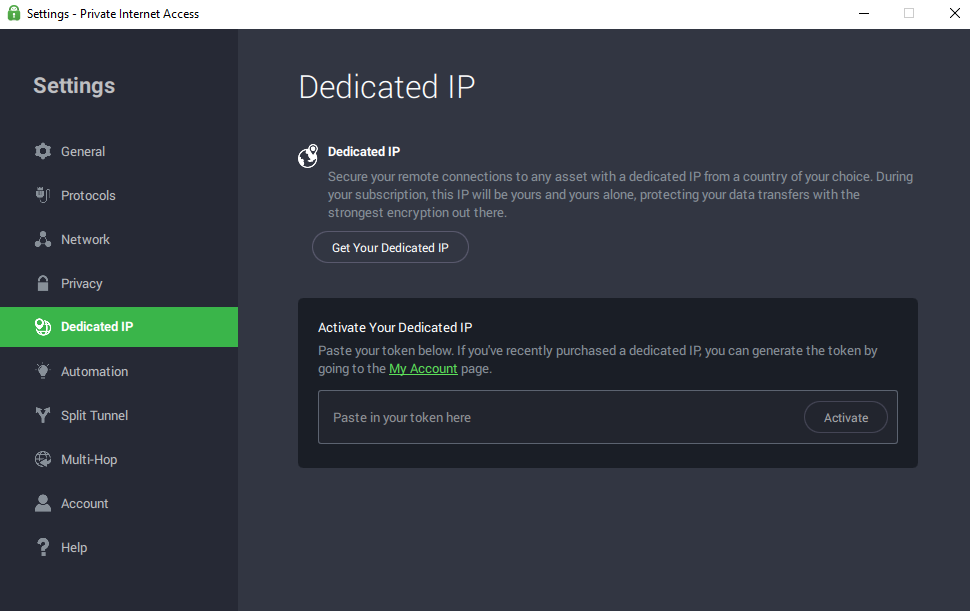
#2. PIA Automation
PIA’s automation feature helped me to set the VPN to connect automatically on certain network types according to my preferences. This means I can customize it to automatically protect my connection when I join unfamiliar or public Wi-Fi networks.
#3. Split Tunneling
With PIA’s split tunneling feature, I was able to direct some traffic through the VPN while allowing other traffic to pass directly through my regular internet connection.
This special feature helped me avoid complications when using banking apps that don’t function well with VPNs or when I want to access content from different regions simultaneously.
Privacy Policy of PIA
PIA is transparent about its privacy policy, and while it boasts its no-log policy, it does collect some minor/personal information like email address, payment data, and state or territory and zip code for tax analysis.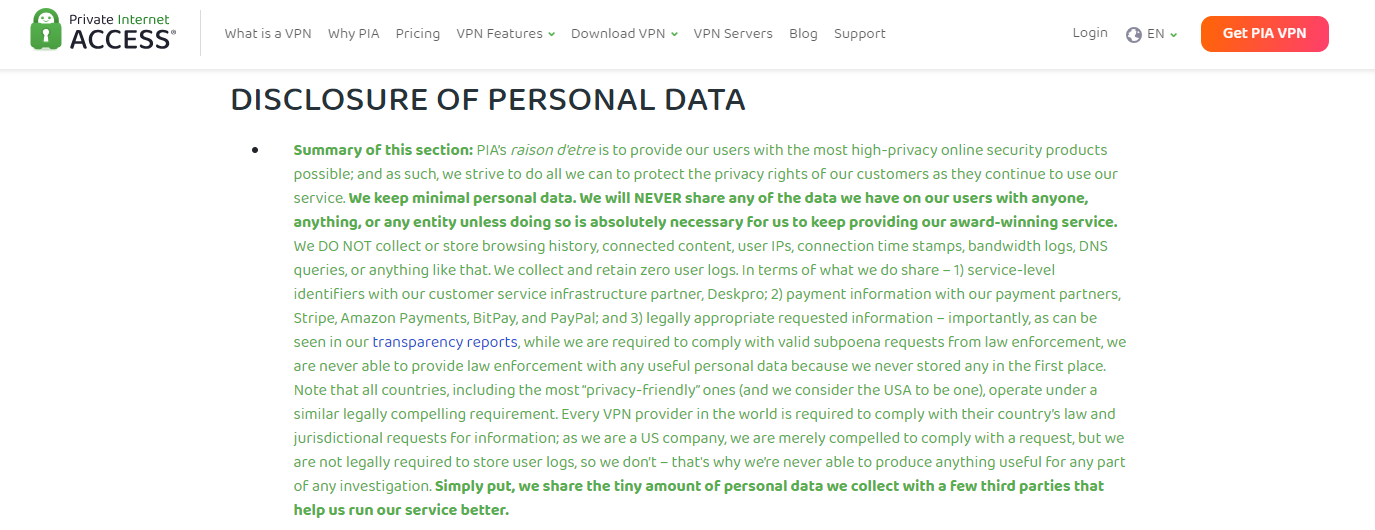
However, rest assured that PIA is independently audited and masks IP and privacy-critical data like browsing history, connected content, user IPs, connection time stamps, bandwidth logs, DNS queries, etc, aren’t gathered or analyzed.
While this isn’t a considerable factor, PIA is liable to provide information to law enforcement (FVEY) and payment partners. Hence, your identity can be at risk, and to avoid it from happening, use cryptocurrency for payments, which PIA accepts.
PIA Pricing
Talking numbers, going month-to-month with PIA might feel a bit steep at $11.95, but if you’re in for the long haul, the yearly plan brings it down to a more wallet-friendly $3.33 per month.
And for the committed fans, there’s an even sweeter deal: lock in for three years, and you’re looking at the same low price of $1.98 per month. While this is a great deal, before proceeding with any of it, I suggest trying it risk-free, backed by a 30-day money-back guarantee.
Wrapping Up
PIA may not take the crown in the fiercely competitive VPN market, particularly when it comes to an exhaustive list of features. But it is an ideal choice for users who are looking for a straightforward, budget-friendly VPN solution. Private Internet Access receives the Geekflare Budget Award for being an affordable VPN that doesn’t skimp on security or privacy.
Whether you’re a casual web surfer, a regular streamer, or someone who just wants a safer online experience, PIA provides a solid, secure foundation to keep you protected and private as you navigate the vast expanse of the internet.
PIA’s tools and features work flawlessly, without a hitch and is one of the best in terms of performance and reliability. PIA stands out as a dependable, no-frills VPN that consistently delivers on its promises.

